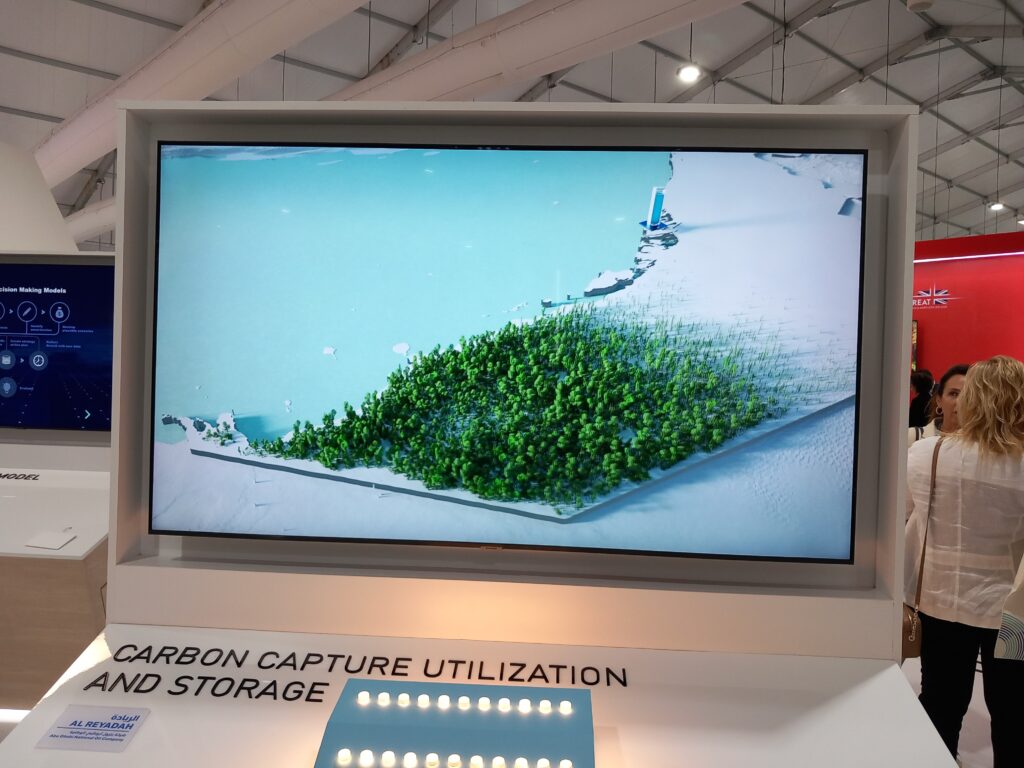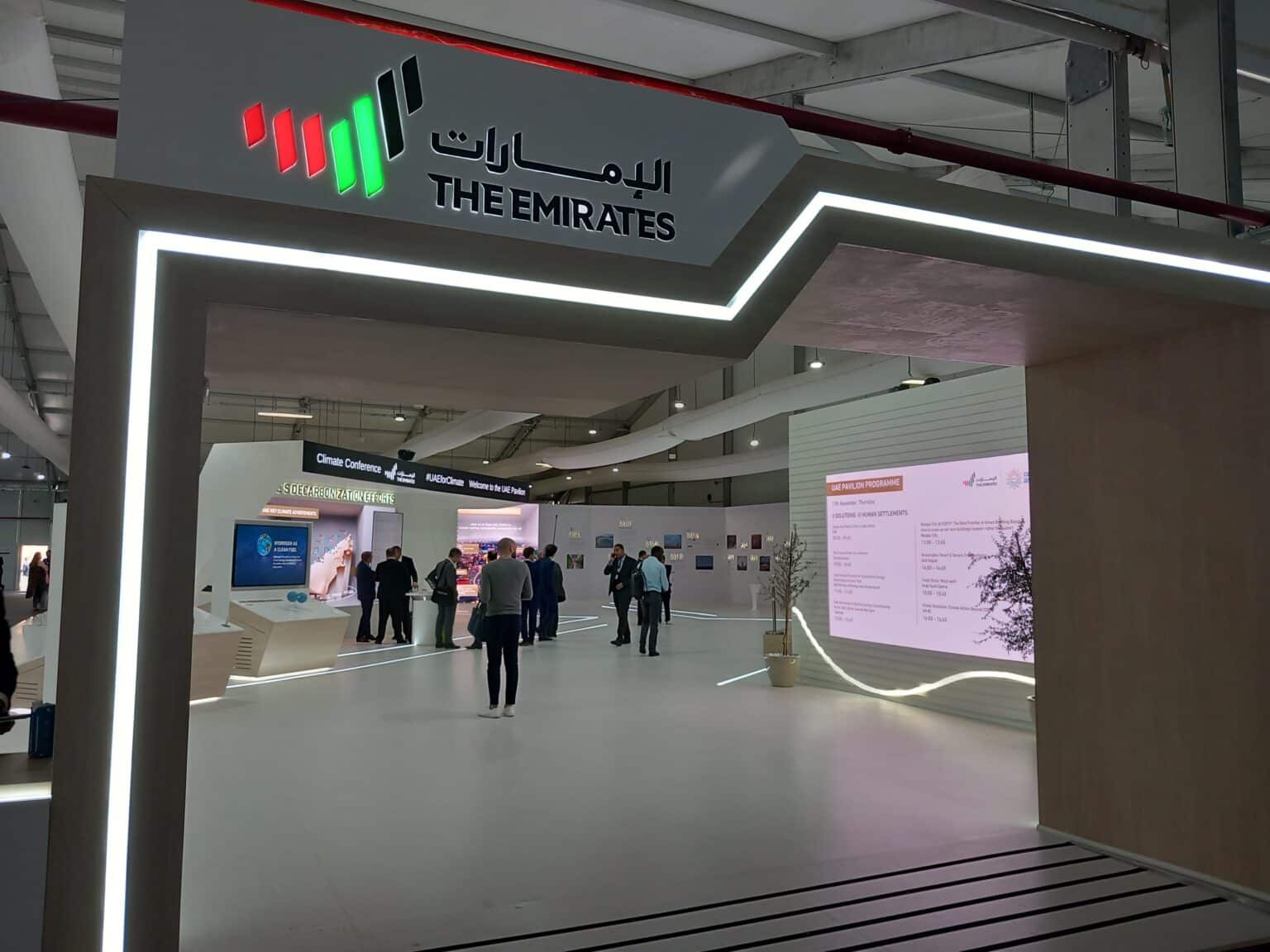The United Arab Emirates has been criticised for promoting oil and gas as a clean source of energy, and for backing “false solutions” such as carbon capture technology, at the UN COP27 climate summit in Egypt, ahead of hosting the event next year.
The Gulf petrostate’s pavilion features displays touting its “decarbonisation efforts” and its “climate action journey” – including a stand run by the state-owned Abu Dhabi National Oil Company (ADNOC), the world’s twelfth largest oil producing company.
An interactive display promotes ADNOC’s Al-Reyadah carbon capture and storage (CCS) facility, which captures carbon dioxide (CO2) produced in steel manufacturing, then pumps the gas back into oilfields to extract more oil.
The stand claims that plans to expand the project’s capacity from an annual 800,000 tonnes of CO2 today to five million tonnes by 2030 will capture the equivalent carbon of a forest “almost a third the size of the UAE”. Even if those plans were realised, however, that would absorb the equivalent of just over two percent of the country’s current overall emissions of about 220 million tonnes, which are projected to rise as it presses ahead with plans to open new gas fields.
The UAE has been using PR companies to try to improve its reputation as it gears up to host COP28 next year, including by lobbying US politicians hostile to climate action, according to the Guardian.
UAE president Sheikh Mohammed bin Zayed al-Nahyan used the opening of the climate summit on November 7 to declare that his country – which sent over 1,000 delegates to COP27 – was a “responsible supplier” and would “continue playing this role for as long as the world is in need of oil and gas”.
“There is no legitimacy in a COP president promoting gas and oil alongside false solutions like CCS”, said David Tong, global industry campaign manager at Oil Change International (OCI), who is attending COP27. “This is a distraction from the reality that we need to keep oil, gas, and coal in the ground.”
Tong pointed to a recent OCI report that found that the UAE is on track to undergo one of the world’s largest expansions in CO2 emissions associated with oil and gas production between 2023 and 2025. “All of this expansion is inconsistent with the Paris Agreement,” Tong said.
The International Energy Agency has said there should be no new investments in oil, gas and coal if warming is to be kept below the Paris Agreement target of 1.5C.

“Clean fossil fuels”
Ahead of last year’s COP26 climate summit in Glasgow, the UAE pledged to cut emissions to net zero by 2050 – an enormous challenge in a country where around 30 percent of Gross Domestic Product is generated directly by oil and gas.
The UAE’s net zero plan includes what it calls “clean fossil fuels” produced by using CCS technologies of the kind promoted by ADNOC at COP27 to offset some of their associated emissions. Experts say that CCS cannot be said to create “clean” fossil fuels, since the projects only ever capture a fraction of the emissions caused by drilling, transporting, refining and burning the fuel.
Environmental groups have warned that the enormous constraints in terms of cost, energy- and water-use, and technical feasibility facing CCS projects mean they may do more to extend the social licence of the fossil fuel industry than they will to slow climate change.
“There’s no such thing as ‘responsible’ oil drilling. More often than not CCS is used to pretend that the burning of fossil fuels can be carried out cleanly. This is a fantasy that’s being used to enable firms to carry on polluting,” said Friends of the Earth’s international climate campaigner, Rachel Kennerley.
“Fossil fuels are driving both the climate and energy crises,” Kennerley said. “We need to leave gas, coal and oil in the ground and rapidly switch to green energy production that delivers for both people and the planet.”
The United Arab Emirates – which describes itself as “one of the least carbon-intensive oil and gas producers in the world” – is the world’s fifth largest CO2 emitter per capita, at 193.5 metric tonnes in 2021, according to the European Commission’s emissions database.
Along with concern over climate records, criticism is growing of the practice of staging COPs in countries with authoritarian governments and poor human rights records, such as Egypt and the UAE, with the case of British citizen Alaa Abd El Fattah’s imprisonment in Egypt, and hunger strike, gaining media attention.
Newly elected Brazilian President Luiz Inácio Lula da Silva has called for the 2024 COP to be held in the Amazon.
The UAE’s climate envoy, ADNOC, and the UN climate body the UNFCCC did not respond to requests for comment.
Subscribe to our newsletter
Stay up to date with DeSmog news and alerts







